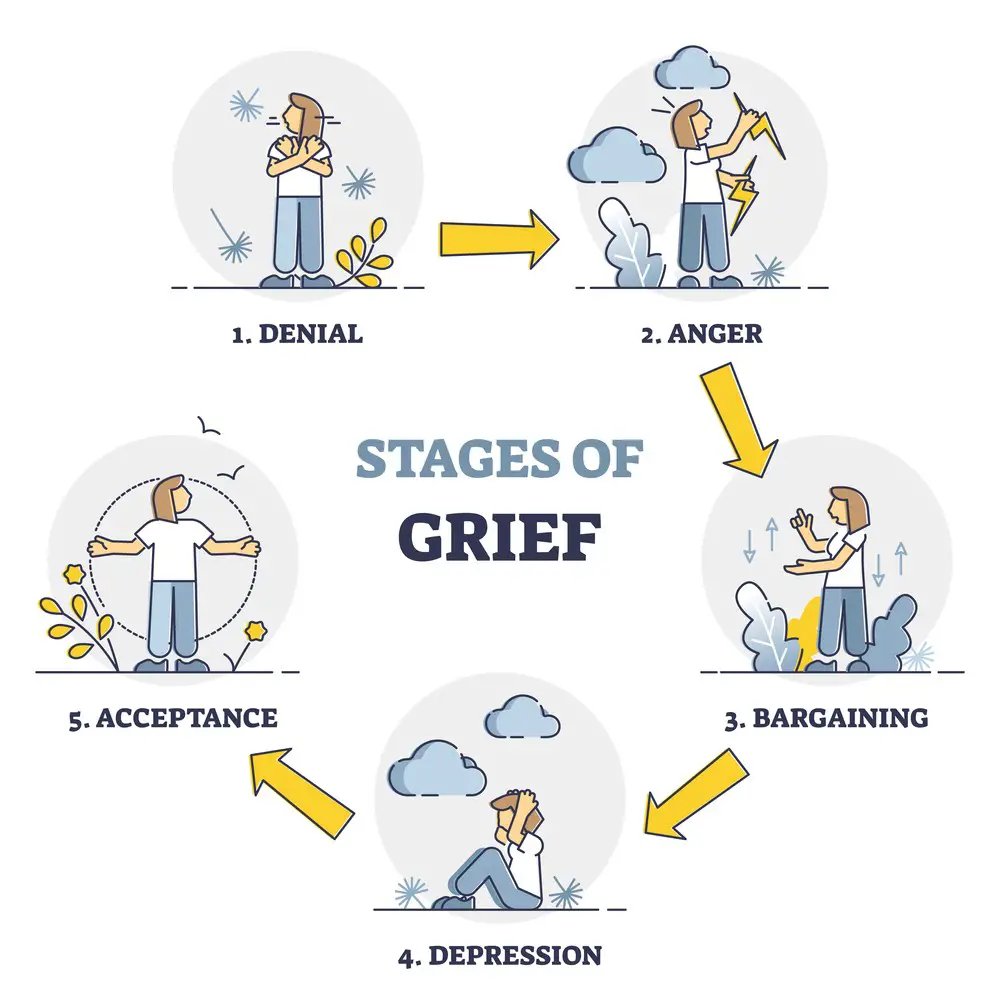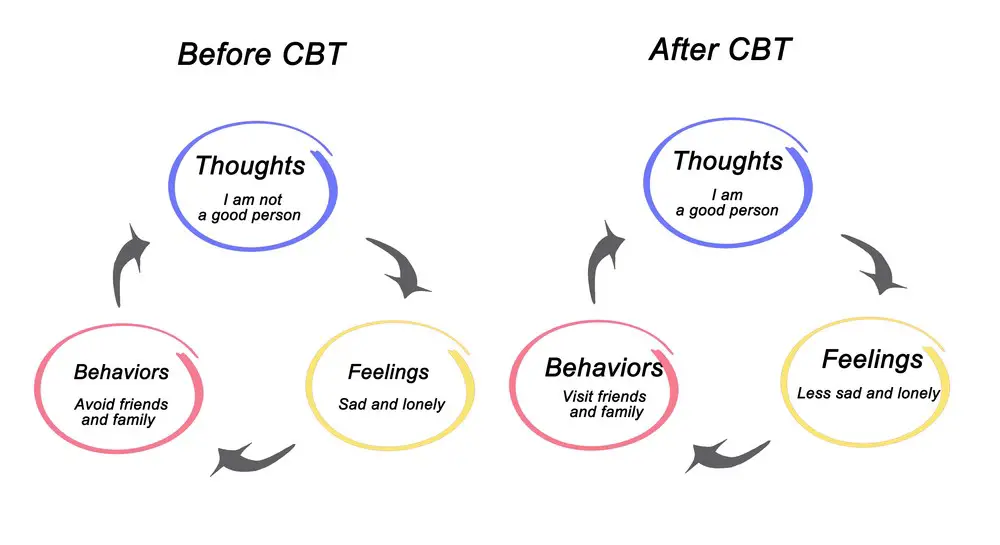As a BetterHelp affiliate, we receive compensation from BetterHelp if you purchase products or services through the links provided
Facing grief can be an overwhelming and isolating experience. It’s a journey that can often feel perilous and without clear direction. Christian grief counseling provides a safe space for individuals struggling with loss to navigate through their pain using faith as a foundation. By integrating Christian principles and professional therapeutic approaches, this type of counseling offers support, guidance, and hope to mourning.
While everyone’s response to loss is unique, many people share similar challenges during the grieving process. These may include feelings of loneliness, despair, and confusion regarding one’s purpose after experiencing a significant loss. Christian grief counseling addresses these common struggles while helping individuals find strength and solace in their faith. The goal is not only to help the bereaved cope with their loss but also to guide them towards healing and spiritual growth.
Finding the right Christian grief counselor near you is vital to the process. This professional should specialize in areas that directly target your needs, such as grief and loss, and should possess understanding and empathy based on their knowledge base and personal understanding of Christian principles. Identifying and working with a counselor suited to your specific circumstances is essential for ensuring a supportive and practical therapeutic experience.
Key Takeaways
- Christian grief counseling integrates faith and professional therapy to help individuals cope with and heal from loss.
- Common challenges faced during the grieving process can be addressed through a supportive and faith-based approach.
- Finding the right nearby Christian grief counselor is crucial for a successful and healing therapeutic experience.
Understanding Christian Grief Counseling
 Importance of Faith-Based Principles
Importance of Faith-Based Principles
Grieving can be a complicated and unique journey for each individual. However, many people turn to their Christian faith to find comfort and support during times of loss. Christian grief counseling is a specialized approach to counseling that integrates faith-based principles, allowing you to explore your emotions and heal from your grief in a manner that aligns with your beliefs and values.
The Christian faith provides a sense of hope and assurance, knowing that your loved one is with God and you’ll be reunited one day. This support is invaluable during the grieving process, giving you a foundation of strength and understanding that secular counseling may not offer. Turning to faith-based principles in your counseling can help you:
- Connect with God and others who share your beliefs
- Find solace in your spiritual journey
- Acknowledge and express your emotions within the framework of Christian teachings
- Discover new ways to cope with grief while staying true to your faith.

The Therapeutic Process
The principles and teachings of the Christian faith guide the therapeutic process in Christian grief counseling. Here are some elements that are common in this type of counseling:
- Embracing faith: The counseling sessions begin by establishing a connection to your Christian beliefs. This can involve prayer, Scripture readings, or discussing how your faith influences your emotions and thoughts during this difficult time.
- Exploration of emotions: A Christian counselor will encourage you to express and examine your feelings in a safe and supportive environment. They may use journaling, open discussions, and prayer techniques to help you gain insight into your grief.
- Applying biblical teachings: By integrating biblical concepts and applying them to your grieving experience, you’ll find ways to understand your emotions, seek forgiveness, and find peace. This can include topics like the book of Job, resurrection, and God’s love during difficult times.
- Developing coping strategies: The counselor will work with you to develop personalized coping strategies that align with your faith, such as praying, attending church services, participating in support groups, or meditating on Scripture.
Remember, each person’s journey through grief is unique, and there is no one-size-fits-all solution. Christian grief counseling allows you to explore and heal from your loss while keeping your faith at the center of that process.

Finding a Christian Grief Counselor Near You
Using Psychology Today
When searching for a Christian therapist or counselor nearby, Psychology Today is a great resource to consider. This website has an extensive directory of licensed mental health professionals, allowing you to filter them based on location and specialty, such as Christian or grief counseling. You can narrow your search by selecting zip codes or cities, like DC or Connecticut. Remember that being specific about your needs and preferences is essential to finding the best counselor.
Some tips for using Psychology Today effectively:
- Use filters to focus on Christian or faith-based counseling.
- Make a list of potential therapists to contact.
- Read reviews and testimonials about their services.
Relying on Personal Recommendations
Another approach to finding a Christian grief counselor near you is to rely on personal recommendations from friends, family, or community members who share your faith. This can be a great way to find a therapist that resonates with your beliefs and aims to address your needs. Your local church or faith-based organization can also be a valuable source of information for recommending trusted Christian counselors in your area.
In summary, to find a Christian grief counselor near you:
- Use resources like Psychology Today to find licensed professionals.
- Rely on personal recommendations and ask around in your faith community.
- Be specific about your needs and preferences when searching and contacting therapists.
Remember, finding the right Christian counselor might take some time, but with patience and persistence, you’ll be able to find one who understands your journey and can help you through your grieving process.

Getting to Know Your Christian Grief Counselor
Professional Background
When seeking a Christian grief counselor, one must consider their professional background. Ensure they have the education, training, and certifications to provide effective counseling. Many Christian grief counselors hold a doctoral degree or a master’s degree in a relevant field, such as:
- Clinical social work
- Mental health counseling
- Pastoral counseling
Some professionals might also have additional certifications in grief counseling, helping them specialize in this area.
Area of Expertise
Understanding the areas of expertise of your potential Christian grief counselor can help ensure that their services align with your specific needs. Different counselors might have different areas of focus or specialization, such as:
- Grief and loss
- Trauma recovery
- Relationship counseling
- Depression and anxiety
Knowing their expertise lets you choose a counselor who will understand, empathize, and best support you through your grief journey.
 Therapy Styles
Therapy Styles
Christian grief counselors may use a variety of therapy styles in their practice, depending on their background and education. These may include:
- Cognitive-Behavioral Therapy (CBT): This may help you identify and modify negative thoughts and behaviors related to your grief.
- Family Systems Therapy: This approach can help resolve conflicts and strengthen relationships in cases where grief affects the entire family.
- Integrative Therapy: This style combines elements from multiple approaches tailored to your needs.
In addition to the therapy styles mentioned, your counselor may incorporate faith-based techniques and scripture to support your journey through grief.
Key takeaway: Choosing a Christian grief counselor with the right professional background, area of expertise, and therapy style can significantly impact your healing process. Gather information about potential counselors to find the best match for your needs.
Therapeutic Approaches and Techniques

Cognitive Behavioral Therapy
Cognitive Behavioral Therapy (CBT) is an effective method often used in Christian grief counseling sessions. This approach helps you identify and challenge negative thought patterns related to loss and grief. By replacing these thoughts with more positive and faith-based perspectives, you can experience emotional healing and find inner peace.
- Identify negative thought patterns
- Challenge and replace them with positive, faith-based perspectives
- Experience emotional healing and inner peace
Remember, CBT is a powerful tool to help you work through your grief in a supportive, Christian-based environment.
Play Therapy
Play therapy is often employed with grieving children, as it helps them express their feelings in a safe, non-threatening environment. This technique uses creative and imaginative play, such as drawing, painting, or role-playing, to allow younger grief-stricken individuals to share their emotions. In a Christian counseling context, play therapy can incorporate Bible stories and faith lessons to guide children toward healing and understanding.
- Creative and imaginative play for emotional expression
- Incorporates Bible stories and faith lessons
- Provides a safe, non-threatening environment
The key takeaway here is that play therapy can be a valuable, comforting approach for children experiencing grief while also reinforcing their Christian faith.
Motivational Interviewing
Motivational interviewing is another technique that Christian grief counselors may use to assist you in moving forward and finding renewed purpose after experiencing a loss. This empathetic, conversational approach helps you to explore your feelings and emotions while uncovering your values and how they align with your faith.
- Explore feelings and emotions.
- Uncover personal values and faith alignment.
- Encourages forward movement and renewed purpose
Through motivational interviewing, a skilled Christian grief counselor supports you in finding meaning, drawing from your faith, and helping you rediscover a sense of purpose after your loss.
The Environment in a Christian Counseling Session
Comfortable and Responsive Space
In a Christian counseling session, the office should provide a comfortable and responsive environment to help you feel at ease. A soothing atmosphere can contribute to your sense of peace, making it easier to express your emotions, thoughts, and beliefs openly. Aesthetically pleasing interiors, gentle lighting, and appropriate space can all support an environment conducive to healing. Remembering your comfort is paramount in this setting, allowing the counselor to understand and address your needs with empathy.
Maintaining Confidentiality
A critical aspect of any counseling session is the assurance of confidentiality. In a Christian counseling setting, your privacy is respected and considered sacred. Counselors understand that for you to trust and engage in the healing process, you must be assured that your conversations and shared emotions are safe. Rest assured, professional Christian counselors uphold strict ethical guidelines regarding confidentiality, ensuring your trust is well-placed in this safe and sacred space.
Remember, a comfortable office environment and the assurance of confidentiality are key elements in Christian grief counseling. These aspects allow you to openly share, reflect, and receive guidance on your journey towards healing and rediscovering faith amid loss.
Addressing Other Related Issues
Aside from grief counseling, many individuals may face other concerns such as anxiety, relationship problems, anger, and addiction. In this section, we’ll cover these related issues and discuss how a Christian counseling approach can help in addressing them.
Dealing with Anxiety
Anxiety can be a debilitating issue, both physically and emotionally. Fortunately, a faith-based approach can provide comfort and guidance, grounding you in times of heightened stress. By connecting with a Christian therapist, you can explore coping strategies, prayer, and spiritual practices that can reduce anxiety and bring peace to your life.
Handling Relationship Issues
Relationships are a significant part of our lives, and maintaining healthy ones can be quite challenging. A Christian counselor can help you navigate relationship complications by incorporating biblical principles in your communication, conflict resolution, and overall approach to your relationships. A faith-based perspective can be a valuable foundation for fostering a loving and understanding environment, whether it’s marriage or friendships.
Managing Anger
Anger management is a crucial skill in maintaining healthy relationships and emotional well-being. Christian counseling can help you explore the root of your anger and provide biblical guidance on expressing frustration constructively. By embracing a faith-based approach to anger management, you can learn self-awareness, forgiveness, empathy, and healthier communication techniques.
Addiction Counselling
Addiction can be a challenging battle to overcome, but Christian counseling offers a unique perspective that encompasses spiritual healing. By connecting you with faith-based resources, a Christian therapist can help you identify underlying issues, develop coping strategies, and utilize prayer and scripture to assist with recovery. Embracing the power of faith when overcoming addiction can lead to sustainable change and a fulfilling life.
Christian Grief Counseling for Specific Groups
Christian grief counseling recognizes the unique needs and challenges faced by different individuals and groups. In this section, we’ll explore how these counseling services cater to the specific needs of children, young adults, families, and military families.
Children and Young Adults
Grieving children and young adults might have difficulty understanding and expressing their emotions. Christian grief counselors can help young individuals by providing age-appropriate activities and advice based on biblical teachings. They focus on building trust and helping the youth understand that their feelings are natural while introducing the concept of God’s presence and support. Some strategies used in this setting include:
- Guided prayers
- Interactive storytelling from the Bible
- Creative arts and crafts
- Small group activities
These approaches offer comfort and guidance to young individuals, fostering a sense of belonging and hope in their healing journey.
Families
Losing a loved one can cause ripple effects throughout the entire family. Christian grief counseling for families provides a safe space for each member to express their thoughts and emotions. Counselors often encourage open communication, allowing a deeper understanding of each family member’s feelings. Biblical teachings and ideas, such as the importance of forgiveness and the hope of eternal life, are woven throughout the counseling sessions. Techniques that can be used within families include:
- Group prayers and reflections
- Structured conversations facilitated by a counselor
- Role-playing to help promote empathy and compassion
- Joint activities that promote bonding
Families are guided through their grieving process with the foundation of their Christian faith, ultimately helping them find peace and healing together.
Military Families
Military families face unique challenges due to their lifestyle, including relocations and extended deployments. The loss of a family member who served in the military can bring about additional layers of grief and trauma. Christian grief counseling for military families pays special attention to these unique struggles and provides tailored support for coping and healing. A few key components of this counseling approach might involve:
- Specialized prayers for military families
- Invoking spiritual warfare and the armor of God
- Support groups specifically designed for military family grief
- Utilizing scripture that addresses courage, sacrifice, and honor
Military families can find solace in their faith as they navigate through their grief. Christian grief counselors help create an environment where hope, love, and healing are possible, empowering families to lean into their faith during tough times.
How Christian Counseling Helps
Promoting Healthy Coping Methods
Christian grief counseling supports healthy coping methods by integrating psychological and faith-based principles into the therapy process. As you navigate through feelings of loss and sadness, your counselor can help you utilize spiritual tools, such as prayer and Scripture, along with proven psychological strategies for processing your emotions. Some coping methods you may explore in sessions include:
- Meditating on specific Bible verses
- Praying for peace and healing
- Engaging in spiritual community support
- Practicing mindfulness and gratitude
You can find comfort and healing in your spiritual journey by combining faith-based practices with therapeutic techniques.
 Supporting Mental Health
Supporting Mental Health
Grief can be overwhelming, affecting both your emotional and mental well-being. With Christian counseling, you gain a responsive support system that understands your unique mental health needs. Your therapist may address common mental health issues associated with grief, such as depression or anxiety. Addressing these concerns from a faith-based perspective can strengthen your overall well-being and develop a deeper connection to your beliefs.
Enhancing Communication Skills
Another essential aspect of Christian counseling is improving communication skills to promote healthy interpersonal relationships. Your counselor can assist you in developing effective strategies for expressing your emotions and needs to the people around you. This can prove vital when seeking support from your faith community and loved ones.
- Practice active listening for better understanding.
- Learn to share your feelings with openness and honesty
- Develop problem-solving skills to address conflicts
By enhancing your communication skills, you can foster meaningful connections that will help you as you journey through the healing process.
Key takeaway: Christian grief counseling promotes healthy coping methods, supports mental health, and enhances communication skills, providing you with the tools and support needed to navigate through your grief.
Pitfalls to Avoid When Seeking Christian Grief Counseling
When seeking Christian grief counseling, it’s important to remember potential challenges and pitfalls that may arise during the process. To ensure you receive the best support on your healing journey, consider these factors:
Identifying Professional Misconduct
One crucial aspect is to be aware of professional misconduct among counselors. This may include:
- Unprofessional or unethical behavior, such as breaking confidentiality or exploiting your vulnerability.
- Misuse or misrepresentation of their qualifications and expertise.
- Failing to maintain appropriate boundaries or engaging in inappropriate relationships with clients, such as infidelity.
To protect yourself, it’s essential to research your potential counselor’s identity, background, and legitimacy before beginning therapy.
Being Aware of Potential Conflicts
Another pitfall to avoid in Christian grief counseling involves potential conflicts that may arise during the therapeutic process. Some possible conflicts include:
- Belief system conflicts: Ensure that the counselor’s approach aligns with your faith-based beliefs and values, so you’re comfortable sharing your grief and exploring faith-based solutions.
- Personal biases influencing the counseling: The counselor should be able to separate their opinions and beliefs from the therapeutic process, allowing for an objective and supportive environment.
- Conflict resolution and communication issues: Effective grief counseling should provide a safe space to express your feelings and learn healthy coping strategies. If your counselor isn’t skilled in conflict resolution or effective communication, this can hinder the therapeutic process.
To navigate these potential pitfalls, it’s crucial to communicate openly with your counselor about your expectations and seek professional support that best suits your needs. Remember, you deserve a supportive, ethical, and faith-based counseling experience that helps you heal from your grief.
Continuing Your Healing Journey
 Joining Grief Support Groups
Joining Grief Support Groups
Losing a loved one is a challenging experience, and it’s crucial to seek help when you need it. Grief support groups offer a safe space for you to share your feelings, learn from others, and find encouragement. In some communities, churches may offer Christian grief support groups that align with your faith-based healing approach.
To find a grief support group near you, consider the following resources:
- Contact your local church or other faith-based organizations in your community.
- Search for local support groups online or in your phone book.
- Speak to a therapist or Christian counselor familiar with grief support services.
These groups can provide valuable support during your grieving process, allowing you to connect with others who share your struggles and faith. Finding a group that resonates with your beliefs and preferences is essential, so don’t hesitate to explore your options.
Engaging with Grief Works
Another critical step in your healing journey is discovering helpful resources to offer guidance and insight as you navigate your grief. Grief works, often in books or online articles, can provide helpful coping strategies and inspiration from authors who have experienced and managed the grieving process.
Here are a few recommended Christian grief works to consider:
- A Grief Observed by C.S. Lewis
- Healing After Loss: Daily Meditations for Working Through Grief by Martha Whitmore Hickman
- Through a Season of Grief: Devotions for Your Journey From Mourning to Joy by Bill Dunn and Kathy Leonard
You’re taking essential steps to continue your healing journey by exploring grief support groups and works. As you engage with these resources, remember that each individual’s grieving process is unique, and there’s no “right way” to grieve. Allow yourself the time and space you need to heal while leaning on your faith and the support of others.
Frequently Asked Questions

What’s the best way to find a Christian grief counselor near me?
To locate a Christian grief counselor in your area, ask for recommendations from friends, family members, or religious leaders such as pastors. Additionally, you can consult online directories specializing in faith-based therapists, such as Psychology Today or Focus on the Family. Be sure to research their specialties and read reviews to ensure they fit your needs.
How can faith-based counseling help with grief?
Faith-based counseling, such as Christian grief counseling, adds a spiritual dimension to traditional psychological approaches. This type of counseling incorporates principles from the Bible and Christian teachings, offering comfort and hope to those mourning a loss. Through prayer, reflection on scripture, and guidance from a counselor well-versed in faith-based strategies, you can find solace while working through your grief.
Are there any support groups for grieving Christians nearby?
Local churches and Christian organizations often host support groups for grieving individuals. Check your church’s bulletin board or website, or speak with your pastor to find out if any groups are offered in your area. Another option is to search for online communities and forums geared explicitly toward Christians experiencing grief.
What’s the difference between secular and Christian grief counseling?
While both secular and Christian grief counseling aims to assist individuals in processing their grief, the main difference lies in their approach. Secular counseling focuses on psychological techniques and therapies, whereas Christian counseling incorporates faith, prayer, and scripture as central components in the healing process. This distinction allows those who find solace in their beliefs to further benefit from counseling that aligns with their spiritual values.
Can a Christian counselor help me find spiritual healing after a loss?
Yes, a Christian counselor can be instrumental in guiding you toward spiritual healing after experiencing a loss. Incorporating biblical principles and teachings can offer support that aligns with your faith, providing comfort, hope, and a renewed sense of purpose. Ultimately, Christian grief counseling seeks to help you find peace by strengthening your relationship with God during this difficult time.
What resources do Christian counselors offer for coping with grief?
Christian counselors offer a variety of resources to help you cope with grief, including personalized therapy sessions, faith-based support groups, and workshops. They may suggest books, Bible passages, and other materials to aid in your healing journey. Additionally, counselors can offer guidance on prayer, meditation, and other spiritual practices to support your overall well-being as you work through your grief.
Remember, it’s essential to find a counselor who understands and respects your beliefs so that you can navigate your grief journey with confidence and support.
About Jacob Maslow
After surviving the traumatizing events of 9/11, I took it upon myself to heal through helping others. I’m the primary caregiver of my children and understand from first-hand experience the lonely paths you have to walk as a partner and parent when leaving an unhealthy relationship.
We’re all echoing in a dark space that doesn’t have to be this empty, and that’s been my mission since finding solace and recovery in therapy: To help comfort others who are still in shock and at the prime of their struggle.
I came across BetterHelp after searching for this type of community. I wanted to belong to a body of proactive therapists and supportive therapy veterans who allowed me to see other sides of the story.
It was unconventional, and that’s what attracted me most. During my most challenging times, when my ex-wife completely cut me off from my children, I found comfort and clarity through BetterHelp.
Instead of being chained to a strict therapist recommendation, I was in charge of who I felt understood my struggle most. That allowed me to find my true peace, as I was reunited with those who read behind my words and had first-hand experience with my trauma.
Recovery is a choice; with BetterHelp, that choice will be a few clicks away. You can join their faith-oriented platform, Faithful Counseling, for those with family estrangement and toxic relationship patterns.
- 7 Ideas to Help You Relax and Unwind on a Family Vacation - April 27, 2025
- How Having Cybersecurity Protection Helps You Relax - April 25, 2025
- 8 Reasons Why Spending Time Outside Calms You Down - April 25, 2025
This site contains affiliate links to products. We will receive a commission for purchases made through these links.


 Importance of Faith-Based Principles
Importance of Faith-Based Principles Therapy Styles
Therapy Styles Supporting Mental Health
Supporting Mental Health
 Joining Grief Support Groups
Joining Grief Support Groups

